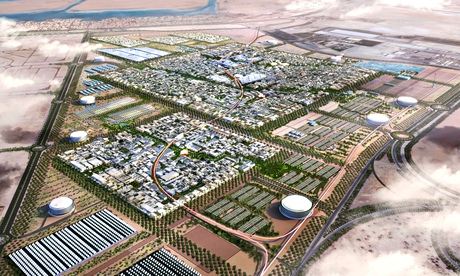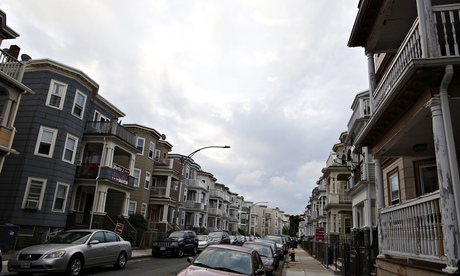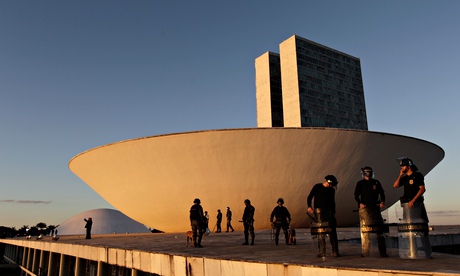Submitted by WA Contents
Too-smart cities? Why these visions of utopia need an urgent reality check
United Kingdom Architecture News - Mar 16, 2014 - 12:09 3263 views
by Gary Graham
Responsive urban technology sounds enticing but citizens must not be disconnected from plans drawn up on their behalf

Masdar City, under development in Abu Dhabi, is seen as meeting needs of businesses and designers rather than people. Photograph: Foster & Partners
I recently attended a government meeting about future cities and found that all the discussion related to branding, bio-tech innovation, hi-tech transport infrastructure and opportunities for universities.
I pointed out that at least half the population doesn't engage with such things directly, if at all. Most people are more concerned with how to get by, and even how to survive in an increasingly hostile city. One civil servant replied, "Oh, you mean the dark underbelly …" This, it seems to me, is exactly how elevated mandarins in London see normal people who live in inner-city communities.
Over the past decade we've watched young people become increasingly immersed in social media. But while these technologies promise to allow us to connect with more people without geographical boundaries, the reality could be more a kind of digital enslavement. So as we develop our cities of the future, we need to think about who makes the decisions.
There are a number of different future-city visions being developed around the world at the moment. Some are smart cities, in which the internet of things allows objects to think smart. Others seek to put sustainability at their heart, with electric cars and transport systems.
The trouble is, large companies such as IBM, Samsung, Cisco and Intel are involved, and have much to gain from the development of future cities. It is companies like these that provide the connectivity needed to make traffic lights talk to each other and the hardware that makes our future services run with precision.
It's not clear at the moment whether future cities are strategic experiments for these companies, or if they are genuinely catalysing theregeneration of inner cities. To investigate some of these visions, I went to MIT in Boston for three months last year. The aim was to find out how people would get their goods and services in the city of the future, and how we we get everyone to engage with city plans.
We decided to test out some ideas with the inner-city communities of Boston in a series of workshops. We essentially combined science fact and science fiction by presenting them with a Boston set in 2037, based on current technological trends projected forward through several imagined scenarios.
We combined the traditional science fiction ideas of utopia and dystopia with realistic technological trends such as artificial intelligence, 3D printing and big data and asked Bostonians to come up with fictional stories about their life in these environments.
Participants talked through imaginary scenarios ranging from the ordinary to the extraordinary. They could control home appliances such as heating using smartphones or saw a future in which the blind were assisted by holographic guide dogs.

The Dorchester neighbourhood of Boston. Residents were asked to envision the city in 2037. Photograph: Jessica Rinaldi/Boston Globe/Getty Images
You could walk your hologram dog in those city urban spaces of ubiquitous public technology. We explored together the possible uses of public technologies in this, bearing in mind the various divides that exist among different users of technology. Social activities are among the most important aspects of urban life that need to be supported through the introduction of new technology and services. In another story, an elderly female character with dementia navigated various everyday situations with the help of her intelligent wrist computer.
Although participants felt positive about future technology, the scenarios they imagined involved using it as an accessory to city living. They were more pessimistic about the ability of technology to make major changes to their lives either socially and economically or for it to regenerate the infrastructure and economy of inner-city areas of Boston.
Many cited Bowdoin-Geneva as an example. The Boston Globe had recently run a well publicised 68 Blocks social experiment designed to investigate the reasons for this neighbourhood's long history of high crime and shootings. It opened up nothing more than a conversation.
Workshop participants felt smart cities were rather utopian concepts growing from a vision put forward by one group of businesses. There was general agreement that there were often many visions for the city, but "at the moment it's the rich and powerful who determine that future vision."
Many were troubled by the notion that people would live in a city purely because of its technology capabilities and thought there were lots of other important social and cultural reasons influencing people's decisions to live or work somewhere. Just because these urban centres could offer us new ways of living in the future does not negate the importance of the natural environment, history and legacy.
The need to engage young people in discussions about the cities of the future was another recurring theme. Problems of engaging young people in future city planning were also emphasised.
Brasilla was cited as a failed future city vision and others questioned the appeal of living somewhere like Masdar City, the hi-tech cluster under development in Abu Dabi, which is aimed very much at business and innovation rather than the needs of the average person. Increased segregation and welfare costs were also raised as potential side effects of the widened societal gaps that could occur if smart cities became a reality.
The people I worked with generally enjoyed living in Boston and many had migrated there from other cities or countries. It was seen as a friendly and progressive town with a promising future ahead of it. A key message was that people needed to start living smarter, cleaner and more efficiently now if their grandchildren were to inherit a comparable or better Boston in 2037.
None of the participants wanted a bland Masdar type of city. They all wanted something similar to what they have now but with eco-friendly modifications such as better provision for cyclists and a looped rail network like those found in London and Paris.

Police guard the congress building in Brasilia. Photograph: Eraldo Peres/AP
Cities are complex entities, like cells. They are made up of technical, social and physical systems that interact like a human body or an ecosystem. If something goes wrong with such a complex entity, it takes a long time to cure.
The growth of cities and urban areas in the 21st century is putting pressure on living standards, which poses serious challenges for us all. Growth is contributing not only to a crushing cycle of poverty but also crippling social problems, such as drug abuse and crime. Cities are struggling to establish a sustainable economic base and with it employment opportunities, wealth creation, role models and improved local infrastructure.
Ideally a future city will have inner-city areas that are sustainably created through private, for-profit initiatives, and investment based on genuine competitive advantage – not through artificial inducements, charity or government mandates.
The people living in cities far outnumber the people making decisions about what those cities should look like in the future. They are disconnected from the plans being made by companies and even governments on their behalf.
We need to start working with everyday citizens to find the right questions – and then work with them towards developing solutions to the problems they raise.
Gary Graham receives funding from the EPSRC Digital Economy Nemode and Sustainable Societies Initiatives. They funded his placement to Boston.
> via The Guardian
